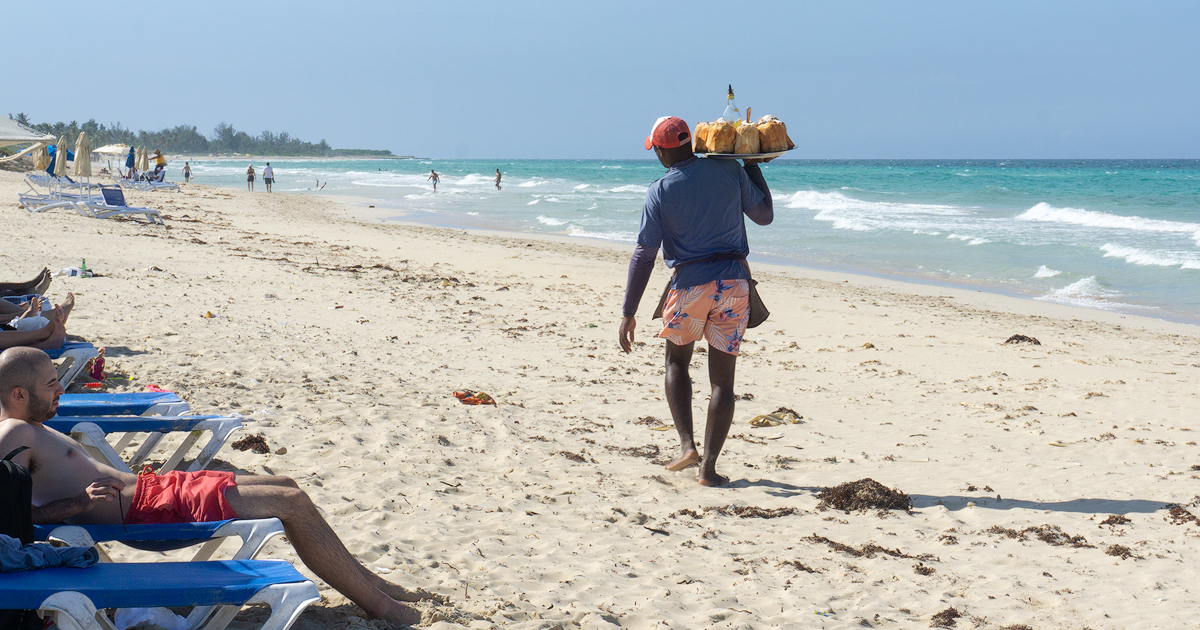Despite the Cuban regime's investment in tourism being 14 times higher than in public health and social assistance, the number of visitors to the island remains stagnant. This makes it increasingly difficult to recover pre-pandemic figures, as 4.2 million tourists visited the country in 2019. According to data from the National Office of Statistics and Information (ONEI), Cuba received 1,905,644 travelers from January to July 2024, a decrease compared to the same period last year. In total, the first seven months of this year saw 15,263 fewer travelers arriving on the island.
To clarify, Cuban authorities differentiate between travelers (anyone moving from one country to another) and foreign visitors. This means that the 1.9 million travelers include all individuals entering the country from abroad, not necessarily tourists. The exact number of tourists is actually 1.4 million.
If we break it down, of the 1.9 million travelers received, the majority are foreigners (1,463,097), but international tourism has seen the most significant decline year-over-year. The ONEI reports a decrease of 26,230 visitors from other countries. According to the statistics office, the top ten nationalities choosing Cuba for their vacations are Canadians, Cuban expatriates, Russians, Americans, Germans, Mexicans, Spaniards, French, Argentinians, Italians, and "others," in that order.
Tourism Numbers Are Grim
Regardless of how you look at it, the data from January to July is not promising. It appears that last month was particularly bad for tourism since, until June, the figures, although tight, surpassed those of 2023. In the first half of the year, 1.6 million travelers arrived on the island (18,845 more than in 2023).
By country, all numbers are down except for Russians (+141%), Mexicans, and Argentinians, both with a 108% increase. From January to July of this year, 123,358 tourists from the Russian Federation arrived in Cuba (35,852 more than in the same period in 2023); 35,086 Mexicans (2,764 more); and 28,978 Argentinians (2,319 more). If the number of Russian tourists continues to rise, Cuba could surpass the goal of 200,000 visitors from that country this year. To achieve this, the island's authorities have been negotiating with airlines to increase the number of flights from Russia and plan to attract investors and hotel companies from that country into the Cuban tourism sector.
Decline in Canadian and Expatriate Visitors
Although Canada remains the primary source of tourists to the island, there has been a year-over-year decrease of 7,911 visitors. This could be due to a warning issued by the Canadian government about the risks of vacationing in Cuba. The authorities of the primary tourist-sending country recommended "extreme caution" due to the increase in violence and crime, the shortage of essential items such as food, medicine, and fuel, and the deterioration of hotel infrastructure.
Similarly, Cuban expatriates remain the second-largest market for the island's tourism sector but have seen a significant drop of 30,280 visitors this year.
The Spanish market has also declined significantly, with 11,797 fewer tourists, making it the second-largest drop. It is followed by Italy, with 5,520 fewer travelers compared to the same period last year.
In the following table, which the ONEI does not compare with 2019 for obvious reasons, you can see that June was the weakest month of the year, with 134,948 international tourists arriving in Cuba. The best month was March, coinciding with Easter holidays, which attracted 281,139 tourists to the island. Additionally, according to the chart, high season data (the first quarter of the year) was better than last year's, so the decline has mainly occurred between April and July.
The Oropouche virus epidemic is also not helping to attract tourists to the island. This past August, U.S. health authorities issued a level 2 alert for the Oropouche virus in Cuba and advised pregnant women not to travel to the country. Despite the lack of transparency from the Ministry of Public Health, data on fatalities from complications have leaked through social media. For instance, CiberCuba obtained the testimony of a father who lost his 3-year-old daughter to an infection complicated by meningitis.
Complaints like that of Argentine tiktoker Georgi, who this month denounced poor conditions at an All-Inclusive hotel in Varadero, also do not help. She reported that the food buffet lacked variety, the pizza had no cheese, and the bread was "like a rock."
Similarly, this week Cuban Yanelys González filed a complaint about the theft of 70,000 Cuban pesos hidden in her luggage while staying at the Grand Memories Santa Maria hotel in Villa Clara.
Frequently Asked Questions About Cuba's Declining Tourism
Below are some frequently asked questions about the current state of tourism in Cuba, based on recent data and reports.
Why has tourism in Cuba declined in 2024?
Tourism in Cuba has declined due to various factors, including increased violence and crime, shortages of essential goods, deteriorating hotel infrastructure, and health warnings about the Oropouche virus.
Which nationalities are the most frequent visitors to Cuba?
The top nationalities visiting Cuba are Canadians, Cuban expatriates, Russians, Americans, Germans, Mexicans, Spaniards, French, Argentinians, and Italians.
How has the Russian tourist market changed in 2024?
The Russian tourist market has seen significant growth, with a 141% increase in visitors compared to the same period in 2023. Cuba has been negotiating with airlines to increase flights from Russia and attract more Russian investors and hotel companies.
What is the impact of the Oropouche virus on tourism in Cuba?
The Oropouche virus has led to a level 2 health alert from U.S. authorities, advising pregnant women not to travel to Cuba. This health crisis has further discouraged tourists from visiting the island.
